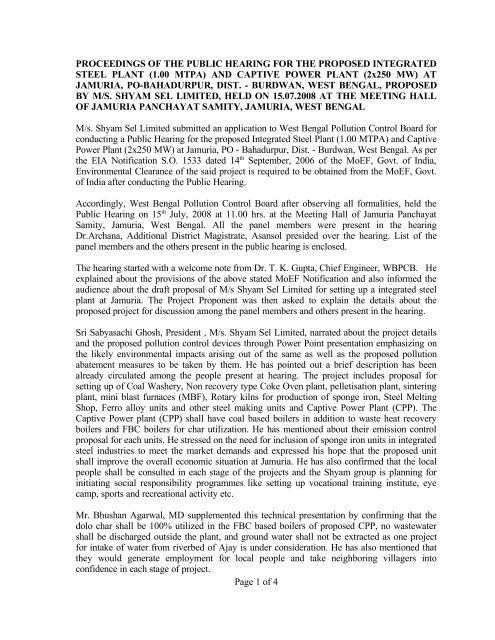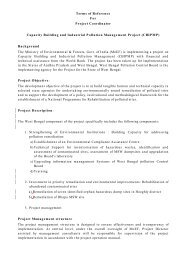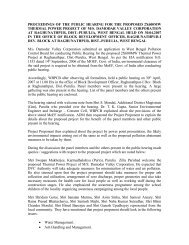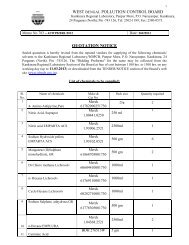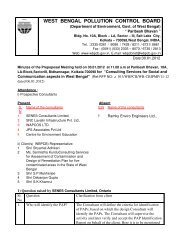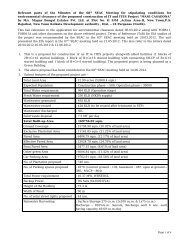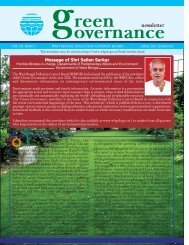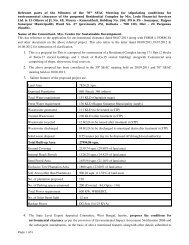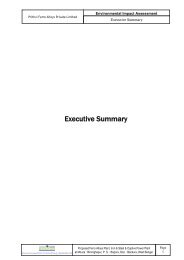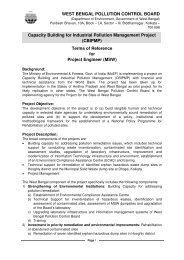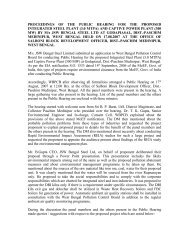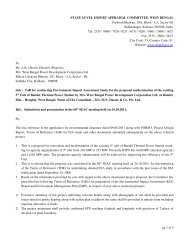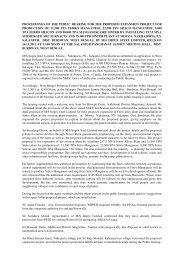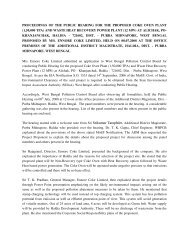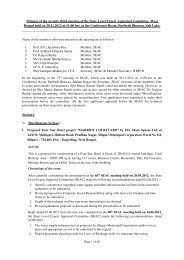M/s. Shyam Sel Limited, Jamuria, Dist. - West Bengal Pollution ...
M/s. Shyam Sel Limited, Jamuria, Dist. - West Bengal Pollution ...
M/s. Shyam Sel Limited, Jamuria, Dist. - West Bengal Pollution ...
- No tags were found...
You also want an ePaper? Increase the reach of your titles
YUMPU automatically turns print PDFs into web optimized ePapers that Google loves.
PROCEEDINGS OF THE PUBLIC HEARING FOR THE PROPOSED INTEGRATED<br />
STEEL PLANT (1.00 MTPA) AND CAPTIVE POWER PLANT (2x250 MW) AT<br />
JAMURIA, PO-BAHADURPUR, DIST. - BURDWAN, WEST BENGAL, PROPOSED<br />
BY M/S. SHYAM SEL LIMITED, HELD ON 15.07.2008 AT THE MEETING HALL<br />
OF JAMURIA PANCHAYAT SAMITY, JAMURIA, WEST BENGAL<br />
M/s. <strong>Shyam</strong> <strong>Sel</strong> <strong>Limited</strong> submitted an application to <strong>West</strong> <strong>Bengal</strong> <strong>Pollution</strong> Control Board for<br />
conducting a Public Hearing for the proposed Integrated Steel Plant (1.00 MTPA) and Captive<br />
Power Plant (2x250 MW) at <strong>Jamuria</strong>, PO - Bahadurpur, <strong>Dist</strong>. - Burdwan, <strong>West</strong> <strong>Bengal</strong>. As per<br />
the EIA Notification S.O. 1533 dated 14 th September, 2006 of the MoEF, Govt. of India,<br />
Environmental Clearance of the said project is required to be obtained from the MoEF, Govt.<br />
of India after conducting the Public Hearing.<br />
Accordingly, <strong>West</strong> <strong>Bengal</strong> <strong>Pollution</strong> Control Board after observing all formalities, held the<br />
Public Hearing on 15 th July, 2008 at 11.00 hrs. at the Meeting Hall of <strong>Jamuria</strong> Panchayat<br />
Samity, <strong>Jamuria</strong>, <strong>West</strong> <strong>Bengal</strong>. All the panel members were present in the hearing<br />
Dr.Archana, Additional <strong>Dist</strong>rict Magistrate, Asansol presided over the hearing. List of the<br />
panel members and the others present in the public hearing is enclosed.<br />
The hearing started with a welcome note from Dr. T. K. Gupta, Chief Engineer, WBPCB. He<br />
explained about the provisions of the above stated MoEF Notification and also informed the<br />
audience about the draft proposal of M/s <strong>Shyam</strong> <strong>Sel</strong> <strong>Limited</strong> for setting up a integrated steel<br />
plant at <strong>Jamuria</strong>. The Project Proponent was then asked to explain the details about the<br />
proposed project for discussion among the panel members and others present in the hearing.<br />
Sri Sabyasachi Ghosh, President , M/s. <strong>Shyam</strong> <strong>Sel</strong> <strong>Limited</strong>, narrated about the project details<br />
and the proposed pollution control devices through Power Point presentation emphasizing on<br />
the likely environmental impacts arising out of the same as well as the proposed pollution<br />
abatement measures to be taken by them. He has pointed out a brief description has been<br />
already circulated among the people present at hearing. The project includes proposal for<br />
setting up of Coal Washery, Non recovery type Coke Oven plant, pelletisation plant, sintering<br />
plant, mini blast furnaces (MBF), Rotary kilns for production of sponge iron, Steel Melting<br />
Shop, Ferro alloy units and other steel making units and Captive Power Plant (CPP). The<br />
Captive Power plant (CPP) shall have coal based boilers in addition to waste heat recovery<br />
boilers and FBC boilers for char utilization. He has mentioned about their emission control<br />
proposal for each units. He stressed on the need for inclusion of sponge iron units in integrated<br />
steel industries to meet the market demands and expressed his hope that the proposed unit<br />
shall improve the overall economic situation at <strong>Jamuria</strong>. He has also confirmed that the local<br />
people shall be consulted in each stage of the projects and the <strong>Shyam</strong> group is planning for<br />
initiating social responsibility programmes like setting up vocational training institute, eye<br />
camp, sports and recreational activity etc.<br />
Mr. Bhushan Agarwal, MD supplemented this technical presentation by confirming that the<br />
dolo char shall be 100% utilized in the FBC based boilers of proposed CPP, no wastewater<br />
shall be discharged outside the plant, and ground water shall not be extracted as one project<br />
for intake of water from riverbed of Ajay is under consideration. He has also mentioned that<br />
they would generate employment for local people and take neighboring villagers into<br />
confidence in each stage of project.<br />
Page 1 of 4
During the discussion the panel members and the others present in the public hearing made<br />
queries / suggestions with respect to the proposed project, which are noted below:<br />
Sri Shambhu Hansda, Dhasna village, welcomed the proposed project with all the<br />
commitments made by the PP during their presentation. He informed that they want the<br />
industry along with infrastructural support and employment for local people.<br />
Sri Dulal Misra, Dhasna village, mentioned about the their bitter experience from the<br />
problems caused by existing sponge iron plants which pollute River. He expressed concern<br />
about the chances of additional pollution burden from this proposed integrated steel industry<br />
with sponge iron units. He informed about the tendency of existing units to run the plant<br />
without emission control devices. He contradicted the claim of Shri Bhushan Agarwal, MD,<br />
<strong>Shyam</strong> <strong>Sel</strong> about giving priority to local people while providing job opportunities.<br />
Sri Jaydeb Ghosh, Bijaynagar village, asked about the progress of work on water supply from<br />
river Ajay bed and expressed his apprehension that in absence of suitable surface water supply<br />
this proposed unit may abstract considerable amount of ground water which in turn shall<br />
create water crisis in neighboring village wells. The villagers are dependent on these wells in<br />
this heavily water constrained region. He like his previous speaker mentioned that they are<br />
apprehensive about the performance of sponge iron units because of the perpetual problems of<br />
existing sponge units.<br />
Shri Hari Ghosh, Dhasal village, Shri Nabani Bagchi and Rupak Sharma, Dhasna village, Shri<br />
Subhas Ghosh Shri Anumay Pal and Amar Pal, Bijayanagar village reiterated their concern<br />
and reservations about sponge iron units. They have mentioned that they preferred industry<br />
without sponge iron operation because of its pollution history. However, all of them opined<br />
that industry without pollution is always welcome for development of the socio-economic<br />
condition of their villages.<br />
Shri Jamuna Pal , Vijaynagar village , mentioned that agricultural lands around the sponge<br />
iron units are yielding low crops due to disposal of solid waste in surrounding area and that<br />
any industry causing pollution is not welcome in the area.<br />
Barun Roy, Dhasna village, mentioned about the low intake of neighboring villagers in their<br />
existing factory by the management of M/s <strong>Shyam</strong> <strong>Sel</strong>. He has mentioned that during<br />
technical presentation the base line ambient air quality data has been shared with the audience<br />
but the villagers would also like to be informed about the post project changes in ambient<br />
data. He proposed that greening programme may be initiated immediately as a part of social<br />
responsibility, which may generate some trust among the near by residents about the<br />
willingness of the project mangers to operate the plant in environment friendly manner. He<br />
sighted the example of the nearby Singarona River. The condition of the Singarona jore /river<br />
deteriorated significantly after some other sponge iron units started their operation in this<br />
locality.<br />
Dr. Archana, ADM, Asansol requested officials of the pollution control board and also the md,<br />
shyam sel to respond to villagers queries. Dr. T.K.Gupta Chief Engineer, WBPCB described<br />
the potential of pollution from such industries and emphasized the need for installation of<br />
appropriate pollution control technologies. He informed that the particulate emission standard<br />
for sponge iron units have been brought down to 100 mg/Nm 3 . The Government of <strong>West</strong><br />
Page 2 of 4
<strong>Bengal</strong> has recently banned setting up of stand alone sponge iron units and encouraged setting<br />
up of sponge iron units integrated with captive power plant for dolochar utilization and down<br />
stream activities. He informed about the provisions of Ground Water Act. No units should<br />
abstract ground water without the prior permission from competent authority. He requested<br />
the project proponent to modify the EIA/EMP report with the following modifications:<br />
1. As per the TOR provided by the MoEF, Government of India, all the sponge iron and<br />
other air polluting industries which are operating within 25 km of proposed plant<br />
should be clearly mentioned in EIA. The names of units which are operating in and<br />
around the <strong>Jamuria</strong> industrial estate should be included in EIA.<br />
2. The material balance should be recalculated after incorporation of necessary<br />
corrections in Ash percentage in coal washery section.<br />
3. The details of dolochar utilization through installation of FBC boilers should be<br />
clearly mentioned in EMP.<br />
4. The unit must confirm that only stamp charging and other cleaner options shall be<br />
adopted in coke ovens.<br />
5. Dedicated bag filters shall be provided in Raw Material Handling area, product house<br />
and cooler discharge section of rotary kilns.<br />
6. The SMS section should be equipped with gas cooling system to ensure safe and<br />
efficient bag filter operation.<br />
7. The Bag filter should be provided at the crusher house of coal washery.<br />
8. Dry defogging systems should be installed in pelletisation plant.<br />
9. The gas cooling system should be installed before bag filter in the Ferro Alloy section.<br />
10. Coal and Char should be stored in covered areas.<br />
11. Dry disposal of the CPP ash should be ensured through pneumatic transfer.<br />
Dr. T. K. Gupta, Chief Engineer, WBPCB, mentioned that adequate measures should be<br />
adopted to eliminate fugitive emission during transportation of raw materials and finished<br />
product. He mentioned that PP should provide adequate arrangement for emission control<br />
system for all units and requested the people present in the public hearing to keep watch on<br />
environmental performances.<br />
Prof. <strong>Shyam</strong>al Sanyal, Ex Vice Chancellor of Jadavpur University and an expert in this field<br />
who was also present during the public hearing requested the proponent to take the public<br />
views raised in this hearing seriously and to design their project accordingly.<br />
Shri A.Fouzdar the AEE-In-Charge of Asansol Region office, WBPCB narrated recent joint<br />
effort by the <strong>West</strong> <strong>Bengal</strong> <strong>Pollution</strong> Control Board and district authorities including the recent<br />
night raids in sponge iron units and regulatory actions thereof against defaulting sponge iron<br />
units in brief.<br />
Shri Subrata Sarkar, BDO, <strong>Jamuria</strong> block acknowledged the reservations of local community<br />
about the setting up of new sponge iron units but he also explained that the sponge iron units<br />
are integral part of the modern integrated steel industries in India. The sponge iron units<br />
should only be allowed as a part of integrated iron and steel units with all types of appropriate<br />
pollution control technologies. These units should be permitted only with proper operation of<br />
pollution control systems. He admitted that industrialization is desired but necessary measures<br />
should be adopted to avoid any public discomfort.<br />
Page 3 of 4
Mr. Bhushan Agarwal, MD, appreciated the various issues expressed by different participants<br />
and welcomed the suggestions. He indicated that the PP will address all the above stated<br />
issues while finalizing the environmental management plan. He confirmed that they will not<br />
abstract ground water without prior permission from competent authority and shall take all<br />
necessary measures to comply with the suggestions made in this public hearing. He also<br />
committed that the social responsibility program shall be taken up in consultation with local<br />
administration.<br />
Dr.Archana, ADM, Asansol, emphasized that all possible measures should be ensured by the<br />
Project Proponent towards the mitigation of all environmental problems and various points<br />
raised by the public present in the hearing. The project is welcome only after incorporation of<br />
all the pollution control measures and corporate social responsibility programmes proposed by<br />
the Project Proponent. Dr.Archana, ADM, Asansol, also assured the public that all the<br />
memorandum submitted by the local people about this proposal shall be duly forwarded to the<br />
Ministry of Environment and Forest, Government of India.<br />
____________sd/-__________________<br />
(Dr. T. K.Gupta)<br />
Chief Engineer - I,<br />
WBPCB<br />
________________sd/-_________________<br />
(Dr.Archana )<br />
Additional <strong>Dist</strong>rict Magistrate,<br />
Asansol<br />
Page 4 of 4


